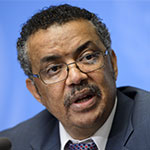
Fortune News | Oct 18,2025
International schools are now mandated to demonstrate that they have exhausted all options for finding qualified Ethiopian nationals before hiring expatriate staff. The policy is part of broader changes stirred by the Minister of Education, Berhanu Nega (Prof), to "promote the hiring of local teachers and administrators" while integrating elements of the national curriculum into the educational experience for students.
The new directive, approved by the Minister, empowers the Federal Education & Training Authority to implement major changes for international schools operating in Ethiopia. It follows the transfer of mandates to oversee international, community, charity, and non-profit schools to the Authority earlier this year.
Shiferaw Shigute, head of the Authority, believes that establishing the unavailability of adequate human capital could incentivise local recruitment.
"We're trying to give qualified nationals the opportunity," he told Fortune.
A trio of directives, two of which have already been approved, is set to shake up the academic space, creating more opportunities for local educators and potentially reducing school costs. Currently, 31 international schools fall under these categories.
These schools must establish student-teacher boards comprised of seven individuals and incorporate elements of the national curriculum, such as geography, history, and civics. Annual registration fees are also capped at 25pc of the monthly school fee. Representatives and administrators from several schools gathered at the Authority's compound in the Shiromeda area three weeks ago to learn about the regulatory changes.
Meqdes Derese leads the Authority's accreditation department. According to her, the transfer of mandates was initially scheduled two years ago, but preliminary preparations delayed the process. She believes sufficient engagement between the Authority and stakeholders has occurred to ensure a smooth transition.
"We're trying to dissuade profit motivations in education," Meqdes told Fortune.
Education authorities believe that codifying specific laws to govern schools gives parents control over fee changes and improves regulatory oversight. The accreditation renewal process, which occurs every two years, will now require stringent compliance with the principles laid out under the directive. Creating student, parent, and teacher committees is intended to serve as a bridge to resolve most internal issues.
During his report to Parliament last year, the Education Minister signalled enhanced regulatory supervision of international schools. Following a high-profile dispute entangling the school's management, he instructed establishing an interim board at the Greek Community School. One of the new changes requires schools to prove either ownership of their property or enter five-year lease agreements with the property owners.
As the Authority announces inspection plans, some schools have already initiated efforts to meet the new standards for kindergarten, primary, and secondary schools.
Bereket Gezahegn, principal at Kelem International School, expressed surprise at the directives' approval. The 78-year-old school, formerly the Swedish International Community School, with 280 students, received notification of the implementation only a few weeks ago.
"I would have liked an explanation on the regulatory changes," he told Fortune.
Bereket questioned the sensibility of treating international schools like national schools, especially since most of their students are foreign nationals who may require a specific environment. He is concerned about the rapid enforcement of staff restructuring, rental agreements, and property requirements without a transition period.
"It's not something that's done overnight," he said.
Teachers in international schools also have concerns.
Sarah Wanjiru, a Kenyan expatriate at one of the schools, is anxious about her job security. International schools already feel burdened by the cost of hiring expatriates. Sarah believes that expatriates provide a valuable service by demystifying curriculums like those from the Cambridge education system and that many are highly qualified.
"Excluding us would be a wrong move," Sarah told Fortune.
The changes also prescribe that classrooms be capped at 30 students with a total area of 20Sqm, and the principal's office should be 16Sqm.
Genet Yemane, owner of Mald International School, acknowledged that the new directive incorporates principles that regulators have discussed for years. She observed that the additional curriculum requirements for Ethiopian students would require a more extended school day and additional class schedules.
"It'll be a tight schedule for the students," Genet told Fortune. "How can we keep up with both curriculums simultaneously?"
Genet echoed concerns about the availability of adequate human resources to meet the regulator's demands for hiring local talent.
"They should offer incentives to meet the regulatory standards," she said.
The concerns expose the difficulties in transitioning to a system that heavily integrates national educational standards while maintaining the integrity and differentiation of international curricula. Experts argue that the potential impact on educators and students, national and international, calls for a balanced approach that considers diverse needs.
Berhanu Moreda, a former advisor at the Ministry, believes that establishing a board addresses fees and the quality of education. He argues that a proper engagement mechanism for stakeholders within the international school ecosystem has been lacking for too long.
Experts with experience in the international school ecosystem raise questions about competence.
Natnael Meknonen, an experienced manager at international schools, has observed issues with the professional conduct of national teachers. According to him, the preference for expatriates often comes from concerns about professional conduct rather than skill.
"Some local teachers are exceptional," Natnael told Fortune.
Natnael noted that many national teachers enter the profession after failing to succeed in a specific career path rather than because they want to be in education.
"Allowing expatriates offers local teachers the learning opportunity," he said.
PUBLISHED ON
Jun 15,2024 [ VOL
25 , NO
1259]

Fortune News | Oct 18,2025

Fortune News | Feb 03,2024

Radar | Feb 10,2024

Advertorials | Jul 24,2024

Radar | Jan 31,2021

Verbatim | Mar 21,2020

Radar | Jan 05,2019

Radar | May 24,2025

Fortune News | Aug 08,2020

Fortune News | Sep 10,2021

Dec 22 , 2024 . By TIZITA SHEWAFERAW
Charged with transforming colossal state-owned enterprises into modern and competitiv...

Aug 18 , 2024 . By AKSAH ITALO
Although predictable Yonas Zerihun's job in the ride-hailing service is not immune to...

Jul 28 , 2024 . By TIZITA SHEWAFERAW
Unhabitual, perhaps too many, Samuel Gebreyohannes, 38, used to occasionally enjoy a couple of beers at breakfast. However, he recently swit...

Jul 13 , 2024 . By AKSAH ITALO
Investors who rely on tractors, trucks, and field vehicles for commuting, transporting commodities, and f...

Nov 1 , 2025
The National Bank of Ethiopia (NBE) issued a statement two weeks ago that appeared to...

Oct 25 , 2025
The regulatory machinery is on overdrive. In only two years, no fewer than 35 new pro...

Oct 18 , 2025
The political establishment, notably the ruling party and its top brass, has become p...

Oct 11 , 2025
Ladislas Farago, a roving Associated Press (AP) correspondent, arrived in Ethiopia in...